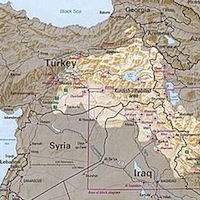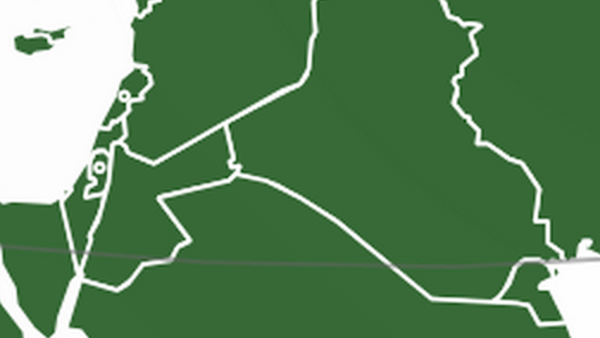
Map (CIA): Ethnically Kurdish zones of Turkey, Iraq, Syria, and Iran.
What a turn of events. Once carved out
with Western support, contrary to Turkey’s wishes, against
genocidal oppression by the Sunni-led minority regime in Iraq, the autonomous Kurdistan Region now sits as the Turkish-backed power player in the future of Iraq during the current crisis. And for the moment it appears to be more sympathetic to the Sunnis than anyone else (while earning global brownie points for graciously sheltering a massive influx of Sunni Arab refugees).
In an interview with the BBC (video), the prime minister of the Kurdish Regional Government, Nechirvan Barzani, said that it will be “almost impossible” for Iraq to go back to the way things were before the fall of Mosul to ISIS. The KRG is now describing everything as pre-Mosul or post-Mosul, like the clock of history got reset last week.
As his economic and political solution to the Sunni disaffection facilitating the ISIS invasion, Barzani called for essentially a soft partition that gives the Sunni areas in the northwest their own regional autonomy like the Kurds already have. (This is, of course, the same idea Joe Biden advocated in 2007 during his presidential bid, to much criticism.)
Barzani also very pointedly said that he will not order the Kurdish Peshmerga paramilitary — some of the best troops in the country — to help retake Mosul or any other city on behalf of the Shia-led central government. He did not however comment one way or the other on the possibility of taking the cities permanently and unilaterally for Kurdistan. I’d been speculating that perhaps the Peshmerga would “liberate” Mosul and Kirkuk, both historically Kurdish cities with large oil fields, from ISIS (and the Arabs more broadly), to reclaim them for the region, which would facilitate full independence. Kirkuk, the political and religious ex-capital, apparently fell into Peshmerga hands last Friday. The Kurdish Regional Government (KRG) asserts that the central government’s prime minister authorized them to take control of the local Iraqi Army headquarters in Kirkuk and provide security to the city as the Iraqi Army was disintegrating in the north.
In another extremely curious turn of events, Turkey, a country long fanatically opposed to an independent Kurdish state even in Iraq due to its own Kurdish separatist movement, seems to have warmed to the possibility of full independence next door in recent years. The party spokesman for the ruling AKP in Turkey, allegedly (according to CNN Turkey, based off incomplete quotes) recently made remarks to an Iraqi Kurdish media outlet indicating that Turkey would now be willing to back the creation of a hypothetical independent Kurdistan in Iraq.
Read more





